专题精讲六(情态动词)
2014高考英语语法复习专题精讲精练 情态动词和虚拟语气.pdf
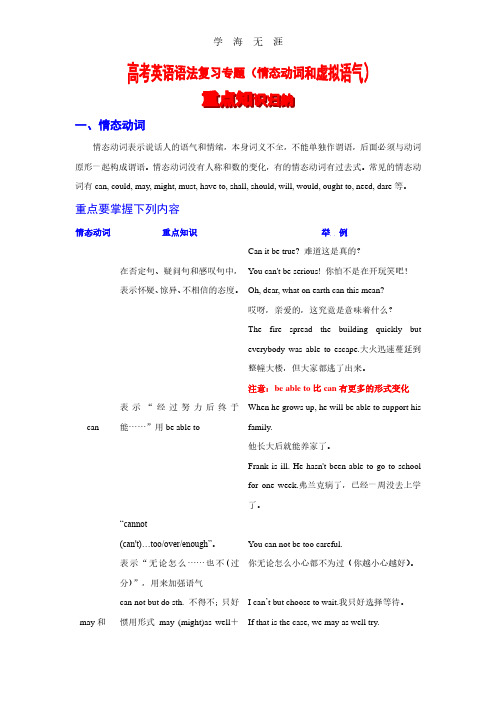
学海无涯
我读完了,你就可以拿走这本书。(允诺)
He shall be punished.他一定会遭到惩罚。(威
胁)
Why/How +should 结构表示说 话人对某事不能理解、感到意 外、惊异等意思,意为“竟会”
Why should you be so late? 你今天来得怎么这 么晚? How should I know? 我怎会知道!(意为:我 不知道。)
could +have done 表示“本可以做而实际上 未能做”。
You could have done better, but you didn’t try your best. 你本来能做得更好的,但你没有尽力。
cannot+ have done 表示“对现在或过去发生 He cannot have been to that small town.
If I had been free, I would have visited you. 如果我有空的话,我就拜访你了。
与将来 事实相反
should/would/ could/might+ 动词原形
过去式 /should+ 动 词 原形/were +to do
If it should rain tomorrow, we would not go camping.如果明天下雨的话,我们就不去野营。
need 还可以用作行为动词,其
变化和一般的动词相同。若主语 We need to have a rest.我们需要休息一下。
为动作承受者时用动词主动形 The house needs repairing.=The house needs to
式表示被动意义或用不定式的 be repaired.这栋房子需要修理。
初中情态动词知识点归纳

初中情态动词知识点归纳情态动词一.专题知识梳理知识点1:情态动词特征1)情态动词(modal verb)本身有词义,表示说话人的语气或情态。
2)情态动词没有人称,数的变化,后跟动词原型。
知识点2:常见情态动词用法1)can(1).表示能力、许可、可能性。
表示能力时一般译为“能、会”,即有种能力,尤其是生来具备的能力,此时may和must均不可代替它。
如:She can swim fast, but I can’t . 她能游得很快,但我不能。
I can see with my eyes.我用眼睛看。
(2).表示许可,常在口语中。
如:You can use my dictionary. 你可以用我的字典。
2)could(1).can的过去式,意为“能、会”,表示过去的能力。
如:He could write poems when he was 10. 他十岁时就会写诗。
(2). could在疑问句中,表示委婉的语气,此时could没有过去式的意思。
如:Could you do me a favor?你能帮我个忙吗?—Could I use your pen? 我能用一下你的钢笔吗?—Yes, you can.可以。
(注意回答)3)must(1).must表示主观看法,意为“必须、一定”。
Must I hand in my homework right now? 我必须现在交作业吗?(2)其否定形式mustn’t表示“一定不要” “千万别” “禁止,不许”如:You mustn’t play with fire. 你不许玩火。
You mustn’t be late.你一定不要迟到。
(3)对must引导的疑问句,肯定回答为must,否定回答为needn’t 或don’t have to .如:—Must I finish my homework?我现在必须完成作业吗?—No, you needn’t.不,你不必。
情态动词基本用法精讲(秀)

8. --Will you stay for lunch?
--Sorry, _____. B My brother is coming to see me.
A. I mustn’t
C. I needn’t
B. I can’t
D. I won’t
9. --May I pick a flower in the garden?
情态动词(Modal Verb):表示说话人的情绪,态度和语气的词。 以can为例子来说明情态动词的特点: 1:I can repair computers. 情态动词 除 ought 和 have 外,后面只能接动词原形构成谓语。 2: She/They can read in Chinese.
2:You may be right.
表示猜测,通常只用于陈述句
3: May you succeed !
表示祝愿!
May you have a good trip!
4:You may as well stay over there.
may/ might as well 还是 -----好
4. — Could I borrow your dictionary?
7:shall 与 should
1用于一,三人称疑问句表示征求对方的意见 和 向对方请示 Shall the driver wait ?What shall we do next ? 2 用于 二 三人称陈述句表示命令警告,允诺, 威胁以及法律条文规定 You shall go with me / He shall be punished . You shall have the book when I finish it. All the children shall go to school at the age of seven.
专题06语法精讲精练(教师版)七年级下册期中考试复习宝典(人教版)含答案
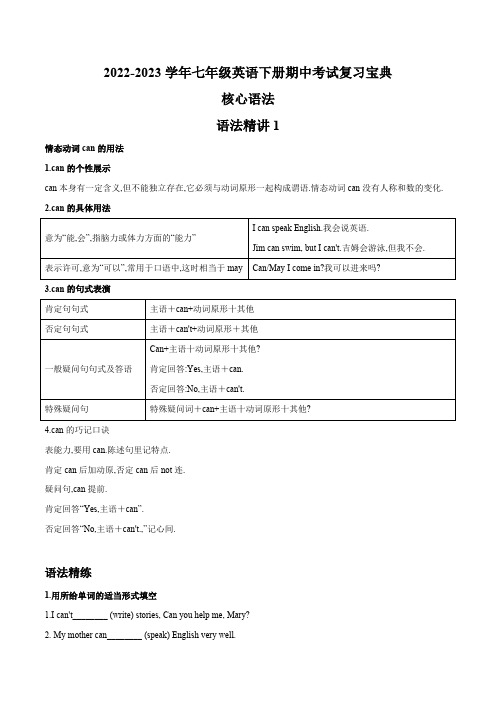
2022-2023学年七年级英语下册期中考试复习宝典核心语法语法精讲1情态动词can的用法1.can的个性展示can本身有一定含义,但不能独立存在,它必须与动词原形一起构成谓语.情态动词can没有人称和数的变化.2.can的具体用法意为“能,会”,指脑力或体力方面的“能力”I can speak English.我会说英语.Jim can swim, but I can't.吉姆会游泳,但我不会.表示许可,意为“可以”,常用于口语中,这时相当于may Can/May I come in?我可以进来吗?3.can的句式表演肯定句句式主语+can+动词原形十其他否定句句式主语+can't+动词原形+其他一般疑问句句式及答语Can+主语十动词原形十其他?肯定回答:Yes,主语+can.否定回答:No,主语+can't.特殊疑问句特殊疑问词+can+主语十动词原形十其他?4.can的巧记口诀表能力,要用can.陈述句里记特点.肯定can后加动原,否定can后not连.疑问句,can提前.肯定回答“Yes,主语+can”.否定回答“No,主语+can't.,”记心间.语法精练1.用所给单词的适当形式填空1.I can't________ (write) stories, Can you help me, Mary?2. My mother can________ (speak) English very well.3.What can your brother________ (do)?4.Miss Lin can't play the piano, but she can________ (sing)well.5.Little Tom can draw, but he________ (can not) dance.答案:1.1.write2.speak3.do4.sing5.can'tII.单项选择1.(2022·百色中考)- ________ you tell us a story in English?-I think I can do it. Let me try.A. NeedB. CanC. ShouldD. Must2.(2022·北京中考)- ________ I take photos here?-Sorry, you can't. It's not allowed in the museum.A. MustB. NeedC. CanD. Will3.We should learn some basic life skills since we________ depend on our parents some day.A. canB. can'tC. mustD. mustn't4. -What kind of music do you like?-I like music that I________ dance to.A. canB. mustC. shouldD. need5.(2022·成都中考)-There is a new art museum in our city. You________ miss it.-Thank you. I won't.A. can'tB. mustC. needn't答案:1.B 考查情态动词辨析.句意:-你能用英语给我们讲一个故事吗?-我认为我能.让我试试.need需要;can能; should应当;must必须.故选B.2.C 考查情态动词辨析.句意:-我能在这里拍照吗?-抱歉,你不能.博物馆不允许拍照.must必须;need需要;can能;will将.故选C.3.B 考查情态动词辨析.句意:既然我们有一天不能依靠父母,我们就应当学会一些基本的生活技能.can 能;can't不能;must必须;mustn't不应该.故选B.4.A 考查情态动词辨析.句意:-你喜欢哪种音乐?-我喜欢能伴着跳舞的音乐.can能;must 必须;should应当;need需要.故选A.5.A 考查情态动词辨析.句意:-我们城市有一个新的艺术博物馆.你不能错过它.-谢谢.我不会的.can't 不能;must 必须;needn't 不必.故选A.III.按要求改写句子(每空一词)1.My father can speak English well.(改为一般疑问句)________ your father________ English well?2.Tom can ride a horse.(改为否定句)Tom________ ________ a horse.3.Mr.Green can do Chinese kung fu.(对画线部分提问)________ ________ Mr. Green________?4.Can Tom and Jim draw pictures?(作肯定回答)Yes, ________ ________.5.play,can,Cindy,well,the,guitar(连词成句)___________________________________________________________________________________________?答案:1.Can;speak2. can't ride3.What can; do4.they can5.Can Cindy play the guitar well语法精讲2一、频度副词定义用来表示频率的副词,叫频度副词.常见的频度副词有:always, usually, often, sometimes, never 等通常在be 动词、助动词或情态动词之后He is always busy.他总是很忙.I will never forget you.我永远也不会忘记你.通常位于实义动词之前They often go swimming.他们经常去游泳.频度副词在句中的位置sometimes 可放在句首、句中或句尾Sometimes she watches TV.她有时看电视.提问how often 意为“多久一次”-How often do you drink milk?-你多久喝一次牛奶?-Every day.-每天.二、一般现在时定义表达现在的状态,主语的性格、能力以及经常或习惯性的动作等He usually takes the bus to school.主语是第三人称单数时,谓语动词用第三人称单数形式他通常乘坐公交车去上学.动词形They watch TV every day.态变化主语不是第三人称单数,谓语动词用原形他们每天都看电视.三、句式结构肯定句句式主语+be/行为动词+其他主语+be+ not+其他否定句句式主语+don't/doesn't+动词原形+其他句式结构Be+主语+其他?一般疑问句句式Do/Does+主语十动词原形十其他?语法精练1.用所给单词的适当形式填空1.Mary usually________ (go) shopping with her mother on Sunday.2. ________ (do)Peter________ (take)a shower in the evening or in the morning?3.Lisa________ (not do) her homework in the evening.4.She never________ (eat) hamburgers for lunch.5.-What time Jack________ (go) to bed?-At 10:30 p.m.答案:1.goes2.Does;take3.doesn't do4.eats5.does;goII.按要求改写句子(每空一词)1.Mr. Green usually goes to work at seven o'clock.(改为一般疑问句)________ Mr. Green usually________ to work at seven o'clock?2.Anna always plays volleyball after school.(改为否定句)Anna________ plays volleyball after school.3.I do my homework at home on weekends.(改为否定句)I________ ________ my homework at home on weekends.4.Lisa sometimes eats bread for breakfast.(对画线部分提问)________ ________ ________ Lisa________ bread for breakfast?5.They usually exercise in the morning.(用he改写句子)________ usually________ in the morning.答案:1.Does;go2.never3.don't do4.How often does; eat5.He;exercises语法精讲3一、how引导的特殊疑问句1.直接由how引导的特殊疑问句询问交通方式How does she get to school?她是如何到校的?询问身体状况How are your parents?你父母身体好吗?询问天气状况How is the weather today?今天天气怎么样?询问程度How do you like the TV show?你觉得这个电视节目怎么样?2.由“how+形容词/副词”引导的特殊疑问句how long意为“多长”,询问时间或物体的长度how far意为“多远”,询问距离how often意为“多久一次”,询问频率how old意为“多大”,询问年龄how many意为“多少”,询问可数名词的数量意为“多少”,询问不可数名词的数量how much意为“多少钱”,询问价格二、交通方式的表达1.take a/the+交通工具take a/the subway/bus/train/boat乘地铁/公共汽车/火车/船动词(短语)2.其他表达方式walk 步行ride a/the/one's bike 骑自行车drive a car 开车1.by+交通工具by bike骑自行车by car/bus/train/subway/boat乘车/公共汽车/火车/地铁/船2.in/on+限定词十交通工具介词(短语)on the bus 乘公共汽车in a car 乘车3.固定表达方式on foot 步行语法精练I.根据句意填写疑问词(组),完成句子1.- _________ does Linda get to school?-She takes the bus.2.- _________ _________ does it take you to get home from work?-About twenty minutes.3.- _________ _________ is it from here?-One hundred kilometers.4.-I walk to school. _________ about you, Jane?-I ride my bike.5.- _________ _________ people are there in the photo?-Six.答案:1.How2.How long3.How far4.How5.How manyII.单项选择1.(2022·安徽滁州凤阳博文国际学校期末) I usually_________ to the bus stop, and then go to school by bus.A. by bikeB. on my bikeC. in my bikeD. ride my bike2.- _________ does Bob usually go to work?-He usually rides his bike.A. WhatB. HowC. WhereD. Who3.(2022·浙江杭州萧山城区期中)-Excuse me. _________ is it to the East Station?-About half an hour by taxi.A. How manyB. How longC. How farD. How old4.- _________ do you visit Uncle Tom?-Once a week.A. How longB. How oftenC. How soon答案:1.D 考查动词短语的用法.句意:我通常骑自行车到公交站,然后坐公交上学.I后面需要一个动词短语.故选D.2.B 考查疑问词辨析.由答语“他通常骑自行车”可知,问句是询问上班的交通方式.故选B.3.C 考查疑问词组辨析.句意:-打扰一下.到东站有多远?--坐出租车大约半个小时.how many多少;how long 多久;how far多远;how old几岁.故选C.4.B 考查特殊疑问词组辨析.由答语“每周一次”可知,问句是询问“你多久拜访一次汤姆叔叔”.提问频率用how often.故选B.语法精讲4一、祈使句1.祈使句的定义表示请求、命令、建议、警告、劝说等的句子叫祈使句.在祈使句中,肯定句一般以动词原形开头,通常省略主语you;否定句在动词原形前加don't.2.祈使句的句式结构祈使句句式肯定句句式否定句句式P型:Please十动词原形十其他Please stand up.Please don't stand up.V型:动词原形十其他Look at the blackboard.Don't look at the blackboard.L型:Let+宾语十动词原形+其他Let her go.Don't let her go./ Let her not go.B型:Be+表语Be careful.Don't be late for class!N型:No+名词/动名词/No photos! No parking!3.祈使句用法口诀祈使句,祈使句,请求、命令或建议.主语是you常省去,动词原形开头记.否定形式要注意,句首要把don't加.要讲客气用please,句首、句末没关系.二、must和have to辨析1.两者均意为“必须”.must更强调说话者的主观意愿,have to强调客观需要,意为“不得不”.2.must一般只表示现在,没有人称和数的变化;而have to则可以用于不同的时态,有人称和数的变化.3.两者的否定式含义大不相同.mustn't 意为“不准;禁止”,而don't have to意为“不必”.【注意】以must开头的一般疑问句,其肯定回答用must;否定回答用needn't或don't have to.语法精练1.用所给单词的适当形式填空1. _________ (finish)your homework first.2. _________ (not come) to the zoo before 6 o'clock, please.3.Please_________ (be) quiet in the room.4.No_________ (swim) in the river!5.They have to_________ (do) their homework when they get home.答案:1.Finish2.Don't come3.be4.swimming5.doII.单项选择1.(2022·广西河池凤山期末) _________ play the guitar here, Jack. It's too noisy.A. Can'tB. NoC. Don'tD. Doesn't2.(2022·湖南郴州期末)-Jack, _________ leave the dirty dishes in the kitchen!-Sorry, Mom.A. can'tB. doesn'tC. don't3.(2022·湖南株洲攸县期末) _________ run in the hallway, children!A. Don'tB. NotC. Can't4.(2022·江西宜春期末)-Can I go out with Lisa, Dad?-Yes, but you_________ come back home before five o'clock, You'll have an art lesson then.A. mustB. canC. mustn'tD. can't5.(2022·浙江宁波海曙区期中)We_________ be noisy in the library and we_________ keep the books clean.A. have to; mustB. must; can'tC. have to; can'tD. can't; have to答案:1.C 考查祈使句.句意:不要在这里弹吉他,杰克.太吵了.祈使句的否定句是“Don't+动词原形”.故选C.2.C 考查祈使句.句意:-Jack,不要把脏餐具留在厨房里.-抱歉,妈妈.祈使句的否定句是“Don't+动词原形”.故选C.3.A 考查祈使句.句意:孩子们,不要在走廊里跑!祈使句的否定句是“Don't+动词原形”.故选A.4.A 考查情态动词辨析.句意:-爸爸,我可以和丽莎出去吗?--是的,但你必须在五点钟之前回家.那时你要上一节艺术课.故选A.5.D 考查情态动词辨析.句意:我们不能在图书馆里吵闹,我们必须保持干净.can't不能;have to不得不.故选D.语法精讲5一、形容词形容词修饰名词,用以说明事物或人的性质和特征.它通常在句子中作定语、表语或宾语补足语等.句中成分说明示例定语一般修饰名词,置于名词之前She is a happy girl.她是一个幸福的女孩.置于系动词(be, look, feel, sound等)之The girl is beautiful.这个女孩很漂亮.表语后,可以被程度副词very, too等修饰宾语补足语说明宾语的状态、特征等What makes you so happy?什么使你这么开心?二、特殊疑问句1.定义及答语特殊疑问词引导的疑问句叫特殊疑问句,其结构为“特殊疑问词十一般疑问句?”回答特殊疑问句不能用yes或no.回答时要针对具体情况来作出回答.2.特殊疑问词特殊疑问词分为两类:疑问代词和疑问副词,其用法归纳如下:Who意为“谁”,用于对主语(人称代词)进行提问Whom意为“谁”,用于对宾语(人称代词)进行提问When意为“何时”,用于对时间进行提问Where意为“哪里”,用于对具体地点进行提问How意为“怎样”,用于对方式进行提问Why意为“为什么”,用于对原因进行提问What意为“什么”,用于对某人的名字、职业等进行提问Which用于对“哪个;哪些”进行提问【注意】由why引导的特殊疑问句,一般要用because引导的从句来回答.because是连词,作“因为”讲,其后要接一个句子来陈述理由.例如:-Why does she do that?-她为什么要那样做?-Because she wants to help the person.-因为她想帮助那个人.语法精练I.单项选择1.(2022·江西赣州兴国期末)-Don't be_________. Jack! Help me clean the room right now!-OK, Mom.A. afraidB. lazyC. shyD. quiet2.(北京海淀区期中) _________ is Jenny from?-She comes from the US.A. WhatB. WhoC. WhenD. Where3.(2022·广西北海期末)- _________ do you like this book?-Because it's exciting.A. WhyB. WhatC. HowD. Who4.(2022·福建莆田期末)My brother is very_________. He can always make new things.A. smartB.busyC. kind5.- _________ was the car invented?-It was invented in 1885.A. WhenB. WhichC. WhoD. Where答案:1.B 考查形容词辨析.句意:-不要懒惰,杰克!立即帮助我清扫房间!-好的,妈妈.afraid害怕的;lazy懒惰的; shy害羞的;quiet安静的.故选B.2.D 考查特殊疑问词辨析.由答语“她来自美国”可知,问句是询问珍妮来自什么地方.对地方提问需用where.故选D.3.A 考查疑问词辨析.句意:-你为什么喜欢这本书?-因为它是令人兴奋的.why为什么;what什么;how怎样;who谁.故选A.4.A 考查形容词辨析.句意:我弟弟很聪明.他总是能制作新东西.smart聪明的;busy忙碌的;kind和蔼的.故选A.5.A 考查特殊疑问词辨析.由答语中的“在1885年”可知,问句是询问“汽车是什么时候被发明的”.对时间提问用when.故选A.II.对画线部分提问(每空一词)1.Linda doesn't like math because it's difficult._________ _________ Linda_________ math?2.I can see some books on the table._________ can you_________ on the table?3.Mr. Green often goes to work at 7:30 in the morning._________ _________ Mr. Green often go to work?4.Lions are from South Africa._________ _________ lions from?5.Most students go to school by bus._________ _________ most students go to school?答案:1.Why doesn't; like2.What;see3.When does4.Where are5.How do。
小学英语语法精讲:情态动词
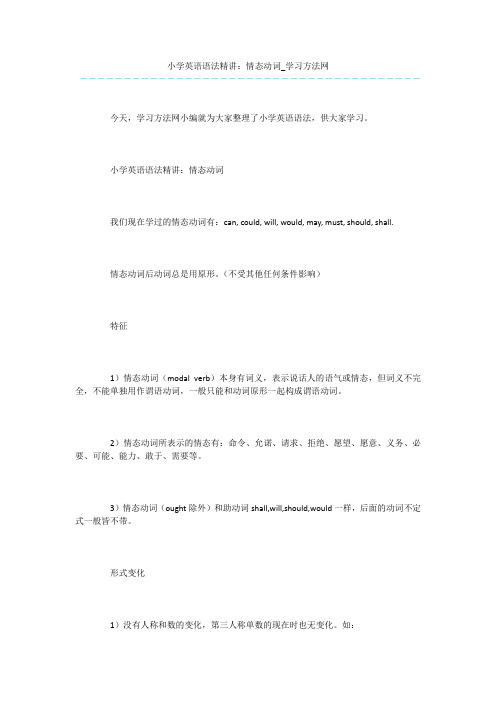
小学英语语法精讲:情态动词_学习方法网---------------------------------------今天,学习方法网小编就为大家整理了小学英语语法,供大家学习。
小学英语语法精讲:情态动词我们现在学过的情态动词有:can, could, will, would, may, must, should, shall.情态动词后动词总是用原形。
(不受其他任何条件影响)特征1)情态动词(modal verb)本身有词义,表示说话人的语气或情态,但词义不完全,不能单独用作谓语动词,一般只能和动词原形一起构成谓语动词。
2)情态动词所表示的情态有:命令、允诺、请求、拒绝、愿望、愿意、义务、必要、可能、能力、敢于、需要等。
3)情态动词(ought除外)和助动词shall,will,should,would一样,后面的动词不定式一般皆不带。
形式变化1)没有人称和数的变化,第三人称单数的现在时也无变化。
如:I can We canYou can You canHeThey canShe canIt2)有些情态动词有过去式,有少数过去式和它的原形相同。
a)有过去式的情态动词有:may -- wouldcan ―― couldmay―― nightshall -- shouldhave to -- had tob)过去式不变的情态动词有:must - must (或had to)ought to - ought toneed---needdare - dare(亦可用dared)3)大多数情态动词后面可用动词的进行式、完成式和被动形式,如:can(may,must)be doing,can(may,must)have done,can(may,must)be done等。
否定式情态动词和助动词一样,后面可直接跟否定词not.现将情态动词的否定式及其否定式的简略式(简略式用于口语中)列举如下:shall not--shan‘t [FB:nt]will not---won’t [wEunt]can not-can‘t [kB:nt]must not-mustn’t [5mQsnt]should not-- shouldn‘twould not-- wouldn’tcould not-- couldn‘tdare not- daren’t [dZEnt]need not-- needn‘t在疑问句中的用法情态动词在疑问句中的用法和助动词相同。
初二下情态动词用法
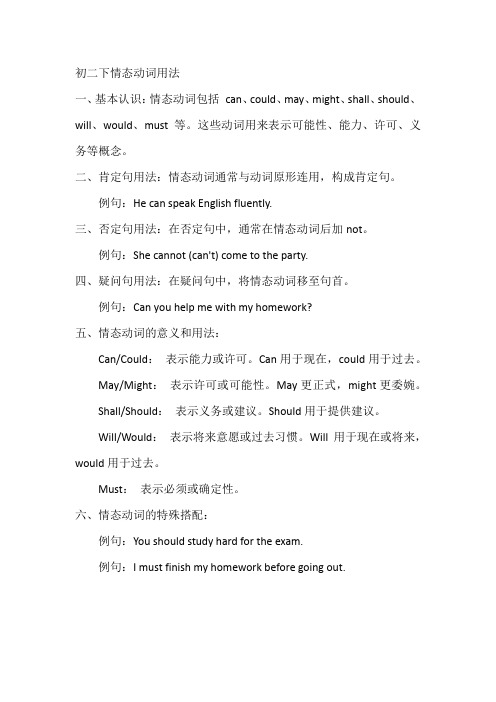
初二下情态动词用法
一、基本认识:情态动词包括can、could、may、might、shall、should、will、would、must等。
这些动词用来表示可能性、能力、许可、义务等概念。
二、肯定句用法:情态动词通常与动词原形连用,构成肯定句。
例句:He can speak English fluently.
三、否定句用法:在否定句中,通常在情态动词后加not。
例句:She cannot (can't) come to the party.
四、疑问句用法:在疑问句中,将情态动词移至句首。
例句:Can you help me with my homework?
五、情态动词的意义和用法:
Can/Could:表示能力或许可。
Can用于现在,could用于过去。
May/Might:表示许可或可能性。
May更正式,might更委婉。
Shall/Should:表示义务或建议。
Should用于提供建议。
Will/Would:表示将来意愿或过去习惯。
Will用于现在或将来,would用于过去。
Must:表示必须或确定性。
六、情态动词的特殊搭配:
例句:You should study hard for the exam.
例句:I must finish my homework before going out.。
六、情态动词和虚拟语气

栏目 导引
第六节 情态动词和虚拟语气
eleven o’clock at night without the teacher’s permission. 根据学校规定,未经老师许可任何学 生夜间11点后不允许外出。
栏目 导引
第六节 情态动词和虚拟语气
(2010· 高考江苏卷 )—I haven’t got the reference book yet,but I’ll have a test
第六节 情态动词和虚拟语气
第六节
情态动词和虚拟语气
栏目 导引
第六节 情态动词和虚拟语气
语法精讲考点整合
考点一 must,may/might, can/could,should表推测 经典品味
栏目 导引
第六节 情态动词和虚拟语气
1.(2011· 高考江西卷)It ________ be the postman at the door.It’s only six o’clock. A.mustn’t B.can’t C.won’t D.needn’t
3.(2012· 运城市模拟)You________as well do this now,for you will have to do it first or last. A.need C.can B.must D.may
栏目 导引
第六节 情态动词和虚拟语气
解析:选D。考查情态动词。may as well不妨,倒不如。句意:你不妨现 在就做,因为你早晚要做。
栏目 导引
第六节 情态动词和虚拟语气
—There might be,but you’d better call the booking office to make sure. ——可能有,不过你最好给订票处打 电话确认一下。
情态动词用法精讲

常见情态动词1、can的基本用法⑴表示体力或智力上的能力,即“能够,会”,可与be able to转换。
—Can you play basketball?—No,I can’t.He can speak English.=He is able to speak English.can只有一般现在时和一般过去式;而be able to则有更多的时态。
如:I’ll not be able to come this afternoon.⑵表示许可,主要用于口语,书面语一般用may。
Can we go home now,please?请问我们现在可以回家了吗?You can only smoke in this room.你只能在这个房间里抽烟。
⑶表示推测时(惊讶、怀疑、不相信的态度),常用在疑问句和否定句中。
How can this be true?这怎么可能呢?The news can’t be true.这个消息不可能是真的。
2、may的基本用法⑴表示请求和允许。
You may come if you wish.如果你想来,你就来。
You may not pick flowers in this park.本公园内不许摘花。
一般疑问句肯定回答用can,may;否定回答用can’t(不可以)/mustn’t(禁止)。
—May I smoke in this room?—Yes,you may./—No,you mustn’t.在一般疑问句中might比may语气更委婉,用于有礼貌地提出请求。
Might I use your phone?我可以用一下你的电话吗?⑵用于祈使句,表示祝愿。
May you succeed!祝您成功!⑶表示推测、可能性(不用于疑问句)。
Your mother may not know the truth.你妈妈或许不知道实情。
It may rain tomorrow.明天可能会下雨。
英语-情态动词
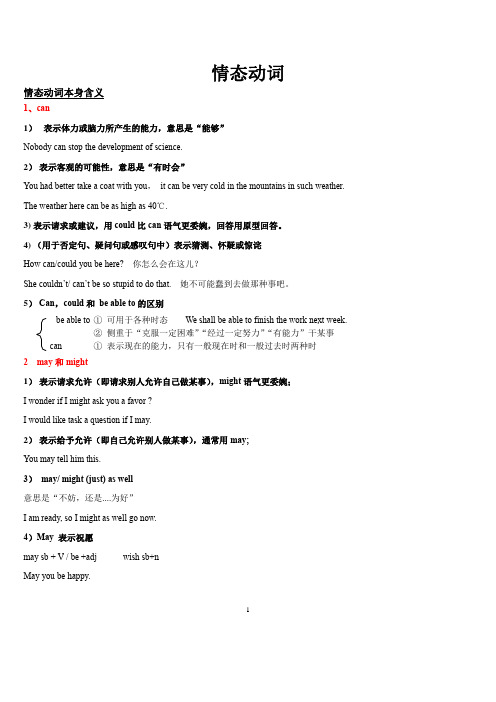
情态动词情态动词本身含义1、can1)表示体力或脑力所产生的能力,意思是“能够”Nobody can stop the development of science.2)表示客观的可能性,意思是“有时会”You had better take a coat with you,it can be very cold in the mountains in such weather. The weather here can be as high as 40℃.3)表示请求或建议,用could比can语气更委婉,回答用原型回答。
4)(用于否定句、疑问句或感叹句中)表示猜测、怀疑或惊诧How can/could you be here? 你怎么会在这儿?She couldn’t/ can’t be so stupid to do that. 她不可能蠢到去做那种事吧。
5)Can,could和be able to的区别be able to①可用于各种时态We shall be able to finish the work next week.②侧重于“克服一定困难”“经过一定努力”“有能力”干某事can ①表示现在的能力,只有一般现在时和一般过去时两种时2 may和might1)表示请求允许(即请求别人允许自己做某事),might语气更委婉;I wonder if I might ask you a favor ?I would like task a question if I may.2)表示给予允许(即自己允许别人做某事),通常用may;You may tell him this.3)may/ might (just) as well意思是“不妨,还是....为好”I am ready, so I might as well go now.4)May 表示祝愿may sb + V / be +adj wish sb+nMay you be happy.13 must1)表示“必须”:可用于肯定句、否定句或疑问句,用于否定句时,mustn’t 的意思是“一定不要,不能”,表示禁止。
高中英语专题精讲之虚拟语气&情态动词精讲
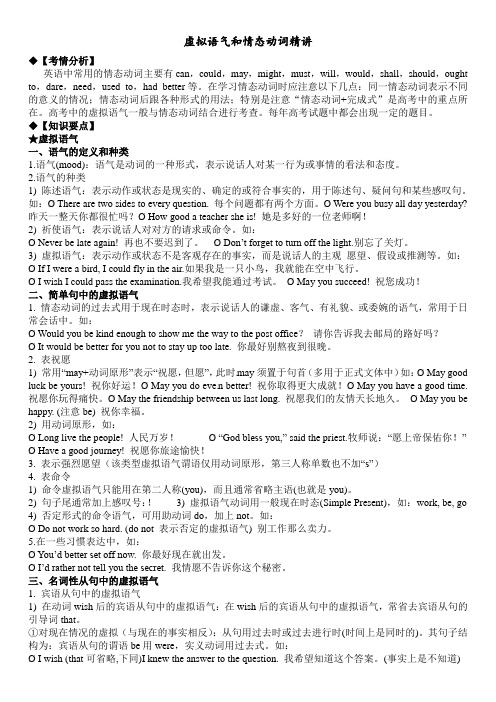
虚拟语气和情态动词精讲◆【考情分析】英语中常用的情态动词主要有can,could,may,might,must,will,would,shall,should,ought to,dare,need,used to,had better等。
在学习情态动词时应注意以下几点:同一情态动词表示不同的意义的情况;情态动词后跟各种形式的用法;特别是注意“情态动词+完成式”是高考中的重点所在。
高考中的虚拟语气一般与情态动词结合进行考查。
每年高考试题中都会出现一定的题目。
◆【知识要点】★虚拟语气一、语气的定义和种类1.语气(mood):语气是动词的一种形式,表示说话人对某一行为或事情的看法和态度。
2.语气的种类1) 陈述语气:表示动作或状态是现实的、确定的或符合事实的,用于陈述句、疑问句和某些感叹句。
如:Ø There are two sides to every question. 每个问题都有两个方面。
Ø Were you busy all day yesterday? 昨天一整天你都很忙吗?Ø How good a teacher she is! 她是多好的一位老师啊!2) 祈使语气:表示说话人对对方的请求或命令。
如:Ø Never be late again! 再也不要迟到了。
Ø Don’t forget to turn off the light.别忘了关灯。
3) 虚拟语气:表示动作或状态不是客观存在的事实,而是说话人的主观愿望、假设或推测等。
如:Ø If I were a bird, I could fly in the air.如果我是一只小鸟,我就能在空中飞行。
Ø I wish I could pass the examination.我希望我能通过考试。
Ø May you succeed! 祝您成功!二、简单句中的虚拟语气1. 情态动词的过去式用于现在时态时,表示说话人的谦虚、客气、有礼貌、或委婉的语气,常用于日常会话中。
单元语法小专题(Grammar Focus)
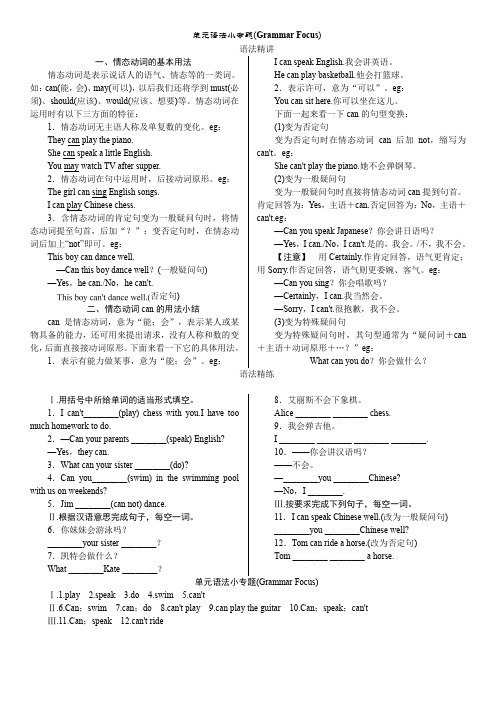
单元语法小专题(Grammar Focus)语法精讲一、情态动词的基本用法情态动词是表示说话人的语气、情态等的一类词。
如:can(能,会)、may(可以),以后我们还将学到must(必须)、should(应该)、would(应该、想要)等。
情态动词在运用时有以下三方面的特征:1.情态动词无主语人称及单复数的变化。
eg:They can play the piano.She can speak a little English.You may watch TV after supper.2.情态动词在句中运用时,后接动词原形。
eg:The girl can sing English songs.I can play Chinese chess.3.含情态动词的肯定句变为一般疑问句时,将情态动词提至句首,后加“?”;变否定句时,在情态动词后加上“not”即可。
eg:This boy can dance well.—Can this boy dance well?(一般疑问句)—Yes,he can./No,he can't.否定句)二、情态动词can的用法小结can是情态动词,意为“能;会”,表示某人或某物具备的能力,还可用来提出请求,没有人称和数的变化,后面直接接动词原形。
下面来看一下它的具体用法。
1.表示有能力做某事,意为“能;会”。
eg:I can speak English.我会讲英语。
He can play basketball.他会打篮球。
2.表示许可,意为“可以”。
eg:You can sit here.你可以坐在这儿。
下面一起来看一下can的句型变换:(1)变为否定句变为否定句时在情态动词can后加not,缩写为can't。
eg:She can't play the piano.她不会弹钢琴。
(2)变为一般疑问句变为一般疑问句时直接将情态动词can提到句首。
肯定回答为:Yes,主语+can.否定回答为:No,主语+can't.eg:—Can you speak Japanese?你会讲日语吗?—Yes,I can./No,I can't.是的,我会。
情态动词用法总结归纳
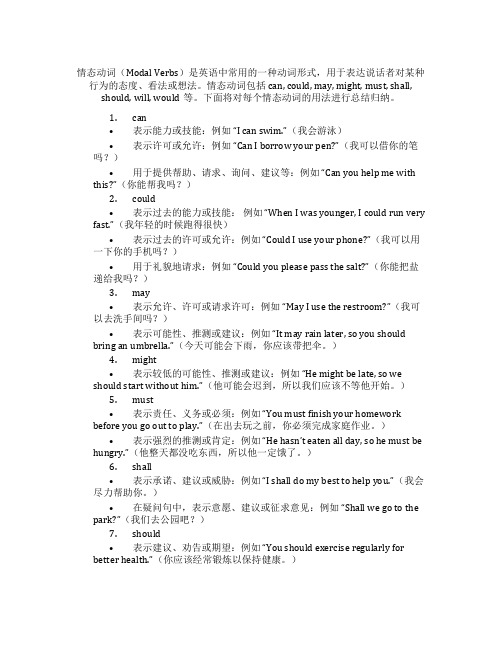
情态动词(Modal Verbs)是英语中常用的一种动词形式,用于表达说话者对某种行为的态度、看法或想法。
情态动词包括can, could, may, might, must, shall, should, will, would等。
下面将对每个情态动词的用法进行总结归纳。
1.can•表示能力或技能:例如“I can swim.”(我会游泳)•表示许可或允许:例如“Can I borrow your pen?”(我可以借你的笔吗?)•用于提供帮助、请求、询问、建议等:例如“Can you help me with this?”(你能帮我吗?)2.could•表示过去的能力或技能:例如“When I was younger, I could run very fast.”(我年轻的时候跑得很快)•表示过去的许可或允许:例如“Could I use your phone?”(我可以用一下你的手机吗?)•用于礼貌地请求:例如“Could you please pass the salt?”(你能把盐递给我吗?)3.may•表示允许、许可或请求许可:例如“May I use the restroom?”(我可以去洗手间吗?)•表示可能性、推测或建议:例如“It may rain later, so you should bring an umbrella.”(今天可能会下雨,你应该带把伞。
)4.might•表示较低的可能性、推测或建议:例如“He might be late, so we should start without him.”(他可能会迟到,所以我们应该不等他开始。
)5.must•表示责任、义务或必须:例如“You must finish your homewor k before you go out to play.”(在出去玩之前,你必须完成家庭作业。
)•表示强烈的推测或肯定:例如“He hasn’t eaten all day, so he must be hungry.”(他整天都没吃东西,所以他一定饿了。
情态动词和时态和语态
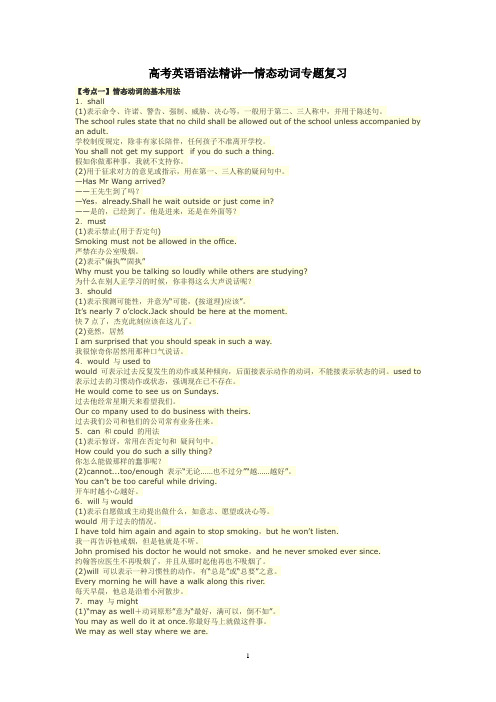
高考英语语法精讲--情态动词专题复习【考点一】情态动词的基本用法1.shall(1)表示命令、许诺、警告、强制、威胁、决心等,一般用于第二、三人称中,并用于陈述句。
The school rules state that no child shall be allowed out of the school unless accompanied by an adult.学校制度规定,除非有家长陪伴,任何孩子不准离开学校。
You shall not get my support if you do such a thing.假如你做那种事,我就不支持你。
(2)用于征求对方的意见或指示,用在第一、三人称的疑问句中。
—Has Mr Wang arrived?——王先生到了吗?—Yes,already.Shall he wait outside or just come in?——是的,已经到了。
他是进来,还是在外面等?2.must(1)表示禁止(用于否定句)Smoking must not be allowed in the office.严禁在办公室吸烟。
(2)表示“偏执”“固执”Why must you be talking so loudly while others are studying?为什么在别人正学习的时候,你非得这么大声说话呢?3.should(1)表示预测可能性,并意为“可能,(按道理)应该”。
It’s nearly 7 o’clock.Jack should be here at the moment.快7点了,杰克此刻应该在这儿了。
(2)竟然,居然I am surprised that you should speak in such a way.我很惊奇你居然用那种口气说话。
4.would 与used towould 可表示过去反复发生的动作或某种倾向,后面接表示动作的动词,不能接表示状态的词。
情态动词详解课件

高考新课标大一轮总复习·配人教版 英语 高考新课标大一轮总复习 配人教版·英语 SdZY 配人教版
表示经过努力而成功地做成某件具体事情时, 【温馨提示】 1.表示经过努力而成功地做成某件具体事情时, 温馨提示】 表示经过努力而成功地做成某件具体事情时 一般用was/were able to,不用 一般用 ,不用could。 。 The fire spread through the hotel very quickly but everyone was able to get out. 尽管大火迅速蔓延到了整个宾馆,但是每个人都逃了出去。 尽管大火迅速蔓延到了整个宾馆,但是每个人都逃了出去。 2.can的一些常用固定搭配: . 的一些常用固定搭配: 的一些常用固定搭配 cannot but do sth./cannot help but do sth./cannot choose but do sth.表示“不得不,只好”。 表示“不得不,只好” 表示
高考新课标大一轮总复习·配人教版 英语 高考新课标大一轮总复习 配人教版·英语 SdZY 配人教版
cannot/can never...enough/too再……也不为过 再……也不为过 3.may的常用固定搭配: . 的常用固定搭配: 的常用固定搭配 may well+动词原形意为“完全能,很可能”,may as well+动 +动词原形意为“完全能,很可能” + 词原形意为“最好,不妨,倒不如” 词原形意为“最好,不妨,倒不如”。 4.must开头的问句,其否定回答用 . 开头的问句, 代替。 开头的问句 其否定回答用needn't或don't have to代替。 或 代替 二、表示推测的情态动词用法比较
高考新课标大一轮总复习·配人教版 英语 高考新课标大一轮总复习 配人教版·英语 SdZY 配人教版
高中英语情态动词精讲与解析

高中英语情态动词精讲与解析(总20页)--本页仅作为文档封面,使用时请直接删除即可----内页可以根据需求调整合适字体及大小--高中英语情态动词精讲与解析概? 说助动词(auxiliary)主要有两类:基本助动词(primary auxiliary)和情态助动词(modal auxiliary)。
基本助动词有三个:do, have和be;情态助动词有十三个:may, might; can, could; will, would; shall, should; must, need, dare, used to, ought to. 上述两类助动词的共同特征是,在协助主动词构成限定动词词组时,具有作用词的功能:1)构成否定式:He didn't go and neither did she.The meeting might not start until 5 o'clock.2)构成疑问式或附加疑问式:Must you leave right nowYou have been learning French for 5 years, haven't you3)构成修辞倒装:Nowhere can he obtain any information about his sister.Hardly had he arrived when she started complaining.4)代替限定动词词组:A: Who can solve this crossword puzzleB: Tom can.A: Shall I write to himB: Yes, do.情态助动词的特征基本助动词与情态助动词最主要的区别之一是,基本助动词本身没有词义,而情态助动词则有自己的词义,能表示说话人对有关动作或状态的看法,或表示主观设想:What have you been doing since (构成完成进行体,本身无词义)I am afraid I must be going. (一定要)You may have read some account of the matter. (或许已经)除此之外,情态助动词还有如下词法和句法特征:1)除ought和used以外,其他情态动词后面只能接不带to的不定式。
- 1、下载文档前请自行甄别文档内容的完整性,平台不提供额外的编辑、内容补充、找答案等附加服务。
- 2、"仅部分预览"的文档,不可在线预览部分如存在完整性等问题,可反馈申请退款(可完整预览的文档不适用该条件!)。
- 3、如文档侵犯您的权益,请联系客服反馈,我们会尽快为您处理(人工客服工作时间:9:00-18:30)。
四、情态动词(D) (2018黄石)33. —It’s too hot, I swim in the lake?—No, you . That’s too dangerous!A. Should; can’tB. Need; mustn’tC. Must; needn’tD. Could; can’t(B) (2018沈阳)3. He look at the stars every night, but now he does not.A. had betterB. used toC. ought toD. had to(C) (2018北京)5. I ______ go now, or I’ll miss my train.A. canB. mightC. mustD. could(A) (2018泰州)12. To keep children away from danger during the coming summer holiday, parents give them some safety tips.A. shouldB. mayC. couldD. might(C) (2018扬州)6.--- If I want to be an astronaut, how will I get to be one?----You do well in school and tame your fears.A. mayB. canC. mustD. could(D) (2018河南)31. —Are you going to the cinema tonight?—l don’t know. I _________go or I _________stay at home.A. will; willB. must: mustC. should; shouldD. might; might(C) (2018黔东南)34. You _______ write the report again because spelling mistakes are not allowed at all.A. mayB. canC. mustD. could(A) (2018安顺)33. --Look! The man welcoming us at the school gate be our headmaster.--No,it be him.He is having a meeting in the office now.A. must; can’tB. must; mustn’tC. can’t; mustn’tD. mustn’t; ca n(C) (2018包头)30.I know what you are thinking about. I can your mind from the look on your face.A. stayB. spareC. readD. at lend(C) (2018曲靖)27.—Hi, class! You come to school tomorrow.—Wow, great news!A. wasn’t able toB. won’t have toC. shouldn’tD. mustn’t(D) (2018无锡)8. —Didn’t you see the zebra crossing? You slow down, son! —Sorry, sir. Am I going to fail the test?A. can’tB. canC. mustn’tD. must(C) (2018滨州)25. —I swim here?—I’m sorry. Children swim alone here. It’s very dangerous.A. Must; can’tB. May; mustC. Can; mustn’tD. Can’t; can(C) (2018苏州)8. She be slow, but at least she doesn’t make stupid mistakes.A. needn’tB. mayC. can’tD. shall(C) (2018菏泽)24. Since you have drunk so much wine, you drive your car.A. needn’tB. wouldn’tC. mustn’t(B) (2018齐齐哈尔)6. —_________I finish my work now? —No, you . You can do it later A. May; needn’t B. Must, don’t have to C. Can, couldn’t(A) (2018福建)23.----Must I hand in the survey on the use of bicycle-sharing right now?----No, you .A. needn’tB. can’tC. shouldn’t(A) (2018临沂)19. Could you please speak a little louder? I hear you very well.A. can’tB. mustn’tC. shouldn’tD. needn’t(B) (2018哈尔滨)7. ----__________ I take photos here?----No, you mustn't. Don’t you see the sign "NO PHOTOS”?A. WouldB. MayC. Must(B) (2018云南)29.—Will you go camping with us, Bob?—I’d love to, but I study for the test.A. mayB. mustC. canD. could(C) (2018重庆B)30、You________stop when the traffic lights turn red.A. can’tB. mayC.mustD. needn’t(D) (2018呼和浩特)8.— The woman over there looks like our English teacher. — It be her.She’ s having a meeting in Beijing now.A.may notB.mustn’ tC.shouldn’ tD.can’ t(D) (2018成都)29. ---Must I come before 6: 30 tomorrow?---No. You______ There will be plenty of time.A. mustn’tB. can’tC. couldn’tD. needn’t(C) (2018海南)29. -Is that Mr. Zhou?-It be him. He has gone to Beijing.A. mayB. canC. can’t(C) (2018重庆A)30.—Must I go out to have dinner with you, Mum?—No, you , my dear. You’re free to make your own decision.A.shouldn’tB.mustn’tC.needn’tD.can’t(B) (2018成都)34.- Wow…another gift! What’s in the box?-I’m not sure. It be a pair of sports shoes.A. mustB. mayC. will(A) (2018乐山)25. –Why ______ we close that chemical factory?–Because it has caused lots of pollution. We need better environment.A. mustB. canC. may(A) (2018上海)34. -Must I do the project on my own?-No, you____.You can work with your classmates.A)needn’t B)can’t C)shouldn’t D)mustn’t(C) (2018青岛)6. This book be Lucy’s. Look! Her name is on it.A. canB. mayC. mustD. might(B) (2018盐城)10. Look, little Jim is swimming so fast. I ________ believe my eyes.A. shouldn’tB. can’tC. mustn’tD. needn’t(A) (2018宿迁)6.--I saw John in the park this morning..--It _____be him. He has gone to HongKong.A. can’tB. canC. mustn’tD. must(B) (2018连云港)3.—How amazing this robot is!—Wow, it has video cameras in its eyes, so it “see” and interact with people.A.mayB.canC.mustD.should(B) (2018邵阳)27.—Must I go home now?—No, you_______.A. mustn'tB. needn'tC. shouldn’t(B) (2018株洲)22. You look so weak! I think you go to see a doctor at once.A. mightB. shouldC. could(C)(2018长沙)21. —The weather report says it's going to have a shower this afternoon. —It does? We'd better now, just in case.A. to leaveB. leavingC. leave(B) (2018长沙)22. — Is the man over there Adam?—It be him. He has gone to Hong Kong on vacation.A. mustB. can’tC. mustn’t(C) (2018宜昌)29.—Mum, I’ve signed for a big box by Future Express(快递). What’s in i t? —I'm not sure. It________ be a present from your brother.A. mightB. mustC. shouldD. will(A) (2018孝感)36.— Lucy is walking the dog in the park.—She be. Listen! She is singing loudly in her room.A. can'tB. mustn'tC. needn'tD. won't(A) (2018咸宁)29. —Mom, I play computer games this evening?—Sure, but you finish your homework first.A. can; mustB. can; mustn’tC. may; couldD. may; can’t(C) (2018武汉)35.—Must you go?—Yes? I'm afraid I really .A. mayB. shouldC. mustD. can(B) (2018安徽)38. —May I watch TV, Dad?—When your homework is finished, you .A. shouldB. canC. mustD. need(D) (2018白银)5.----Can we play soccer here?-----No, you __________play it near the road. That’s too dangerous!A. canB. mayC. won’tD. mustn’t(C) (2018宜宾)23. Mr. Green be at home now. He went abroad on vacation last Friday.A. needn’tB. mustn’tC. can’t(A) (2018广东)41.—Yuan Longping, a famous Chinese scientist, is now doing research on sea rice. —If farmers start planting rice in salty water, China’s food supply will surely rise.A. canB. can’tC. mustD. mustn’t(A)(2018柳州)31.—Can you swim?—Yes, I .A. canB. mayC. must(A) (2018黄冈)29.—Must I finish reading the book today, Mr. Brown? — No, you . You can finish it in two days.A. needn'tB. mustn'tC. can'tD. couldn't。
